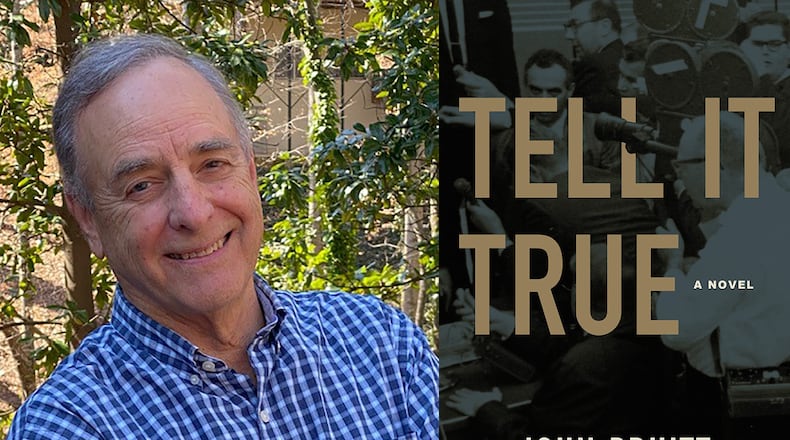In 1964, a fresh-faced 22-year-old camera man for WSB-TV named John Pruitt covered the death of Lemuel Penn, a decorated World War II Black veteran who was murdered by Klansmen in the Athens area just days after the passage of the federal Civil Rights Act.
Nearly a half century later, Pruitt ― who retired from broadcast television in 2010 after more than four decades with WSB-TV and 11Alive (WXIA-TV) ― has released a historical fiction book called “Tell It True” (Mercer University Press), out Oct. 4, that is based loosely on that murder.
“I wanted to recreate that era,” said Pruitt in an interview with The Atlanta Journal-Constitution. “It was my entrée into journalism. I was a naive kid out of college, grew up in a relatively cloistered environment. My first week on the job I’m watching four young Black people almost getting beaten to death by a rabid mob of white segregationists.”
He covered civil rights events that summer of 1964 and for years after that. “It never ceased to impress me the societal revolution I was covering,” he said.
Credit: CONT
Credit: CONT
The primary character in “Tell it True” is a camera man much like Pruitt named Gil Matthews, who works at WDX-TV, which is a proxy for WSB-TV. He and an AP reporter Mindy Williams investigate a murder in fictional Pickett County in North Georgia of a Black World War II veteran Jarvis Pendry driving from Fort Benning to his home in Baltimore.
Pendry was going to spend the night with his uncle but got lost and stopped by a convenience store. The white owner and his son, thinking he is part of a federal effort to force them to treat Black folks equally, kill him in cold blood.
This sets off a clash between a prominent Atlanta Black reverend who believes in nonviolence and an activist Black student group out of Morehouse College that feel the time for nonviolence has passed. Pruitt adds a hot gubernatorial race in the mix between a raging segregationist and a more moderate white man.
There is also an interesting wealthy white Buckhead businessman who works behind the scenes and tries to play puppet master to ensure Atlanta doesn’t turn into Birmingham.
These types of men, Pruitt said, “saw Atlanta as the next great city of the Southeast, a city seen as progressive by the rest of the country.” Their strategy, he said: “keep the lid on with no violence. Let’s accommodate the best we can without going too far, and walk the tightrope.” Their hope: “Economic benefits would flow and that’s exactly what happened to Atlanta and you can see the results today.”
One of his most intriguing characters is the Pickett County sheriff Lucas McSwain, who first comes across as a narrow-minded old-school white Southerner who is angry that the state police and FBI are intruding on his murder investigation.
“In writing fiction, you put characters in situations sometimes and they will do things you don’t expect them to do,” Pruitt said. “That was the case with McSwain. You have to avoid stereotyping. That’s very hard with a rural Georgia sheriff. Lucas has life experience. He was a World War II veteran. He is quick to understand situations and he’s not too proud to accept advice from other lawmen from other jurisdictions like needing to cooperate with the media.”
Although Pruitt began writing the book two decades ago, he said he was too busy and set it aside. Only until he was well into retirement was he able to commit himself to finishing “Tell It True.” In fact, he said he did the bulk of the writing during the protests that followed the George Floyd murder in 2020. “As much as things have changed,” he said, “maybe a lot of things haven’t changed... I would hope my novel will give people a little perspective looking back in 1964 the way we were.”
Pruitt himself has not been forgotten. Mercer University Press has been able to book at least 24 promotional events for Pruitt from the Decatur Book Festival to the Carter Center to the Atlanta History Center in the coming weeks.
“I’m gratified,” he said. “I didn’t do this for attention. I always just wanted to write this novel.”
Credit: COURTESY OF JOHN PRUITT
Credit: COURTESY OF JOHN PRUITT
He gave a first draft of his book to his long-time former WSB-TV co-anchor and good friend Monica Pearson to get her perspective, especially on the racial aspects of the book. She gave him several pages of notes to help him make the story flow better. In the end, she loved the final result.
“It’s such a beautifully written story,” said Pearson, who provided a blurb for the back cover of his book. “It’s a movie in the making.”
Pruitt also procured a very complimentary blurb from civil rights legend Andrew Young, the former U.N. ambassador, U.S. congressman and Atlanta mayor. The commentary was so long, Pruitt used it as an afterword.
“Our arcs have coincided so many times,” he said, including at the Rev. Martin Luther King Jr.’s funeral in 1968. “I was hoping for a blurb. Why not take a shot? Andy’s busy. He’s still very productive. I was stunned by what he wrote.”
In part, Young noted: “I have always admired John Pruitt’s honest, fearless reporting of our struggle, and I also believe members of the news media are among the greatest unsung heroes of the Civil Rights movement.”
BOOK SIGNINGS
“Weaving Fact & Fiction: An Historical Fiction Panel,” Decatur Book Festival. 2:30 p.m. Saturday, Oct. 1. Free. First Baptist Church of Decatur 308 Clairmont Ave., Decatur, decaturbookfestival.com
Books & Bites with Peachtree City Library. 1 p.m. Tuesday, Oct. 4. Free. 201 Willowbend Road, Peachtree City. johnpruittauthor.com
Story on the Square Keynote. 6 p.m. Thursday, Oct. 6. Free. 19 Griffin St., McDonough, www.johnpruittauthor.com
Carter Presidential Library. 7 p.m. Monday, Oct. 10. Free. 441 John Lewis Freedom Parkway NE, Atlanta, www.jimmycarterlibrary.gov
Georgia Writers Museum. 7 p.m. Tuesday, Oct. 11. Free. 109 S Jefferson St., Eatonton, www.georgiawritersmuseum.org
Atlanta History Center. 7 p.m. Wednesday, Nov. 9. Free. 130 W. Paces Ferry Road NW, Atlanta, www.atlantahistorycenter.com
About the Author
Keep Reading
The Latest
Featured






